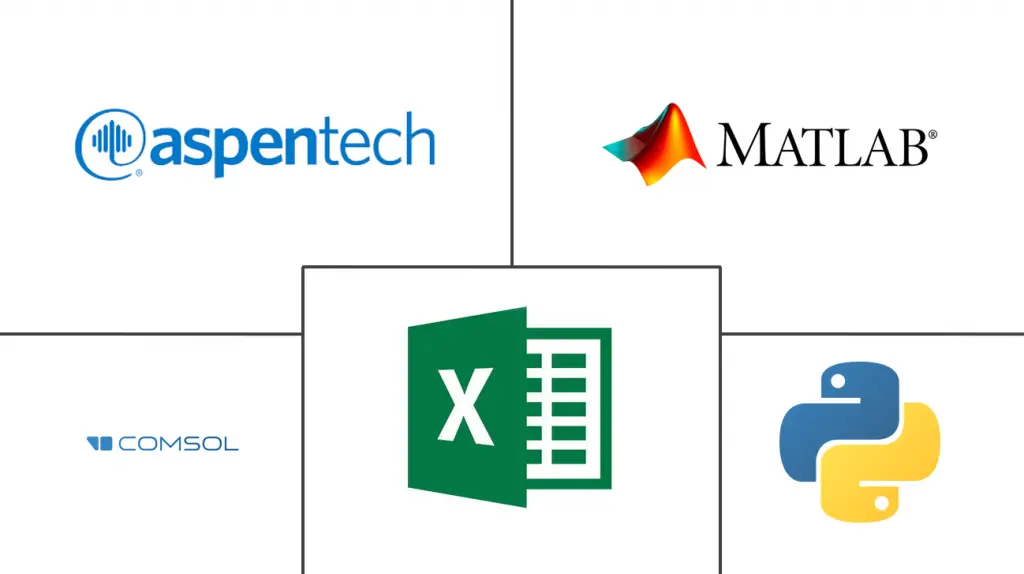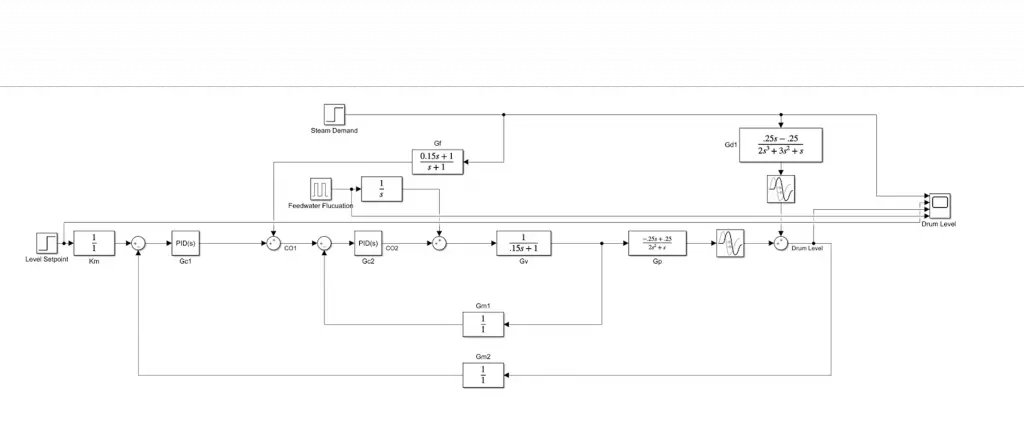
As a chemical engineer in 2024, there’s an array of different roles and industries to work in, many of which will require you to possess some level of aptitude with specialized software.
Although much of this learning can be done on the job, already having the skill set will set you apart in an increasingly competitive job market.
The top 5 most essential software programs and computer skills for chemical engineers are:
Excel is a chemical engineer’s best friend when performing analysis and basic visualization of process data. Process data (temperatures, pressure, flow rates etc.) in most industrial plants is stored on a central data historian and typically requires using a query language like SQL to extract it to Excel.
A working knowledge of Excel is therefore beneficial for performing statistical analysis to draw meaningful insights especially during process troubleshooting. Some of the key features of Excel that I would highly recommend getting familiar with are:
Furthermore, having a working understanding of VBA alongside Excel can be incredibly handy when trying to automate repetitive tasks, generate reports, and lots more.
Excel is extremely popular in the professional world, and it’s not going away anytime soon. Knowing how to utilize the functionality this powerful platform has to offer can really save you lots of time and set you apart in the workplace.
AspenTech owns a range of optimization software for process industries, the most common being Aspen Plus and Aspen HYSYS.
The main difference between Aspen Plus and Aspen HYSYS is that HYSYS is more tuned for modelling petrochemical processes (chemical plants and refineries), whereas Plus is used for more general chemical processes.
Both these software are able to facilitate the core calculations such as mass and energy balance, heat transfer, chemical kinetics, pressure drop, multicomponent VLE equilibrium etc.
ASPEN tech software licenses are incredibly expensive, so utilize the time with the software you have at university to get familiar with it.

Chemical Engineer
During my undergraduate degree, I used both these programs for process modelling and simulation for many chemical processes, including a novel carbon capture and storage process that my capstone group and I developed
MATLAB is a programming language that allows you to perform numeric calculations, analyze data, create various models and develop complex algorithms. There are a number of incredibly useful functions that MATLAB has that help you solve linear equations, nonlinear equations, differential equations, partial differential equations, optimize functions, and much more.
These are all basic skills calculations that chemical engineers will need to be able to perform in industry (especially in process design and research roles), and having a simple and robust tool can really be useful.
Simulink is an add-on that you can link to MATLAB that is critical for process control engineering within chemical engineering. Here is an example of a 3 level boiler level control diagram generated in Simulink for a process control 4th year engineering class.

Python is arguably one of the most versatile and well rounded open source programming languages that has a wide range of applications for chemical engineers from simulations to hardware.
Python and MATLAB have many similarities but they differ in a few critical areas that make having a basic understanding of both a good idea.
For example, one of the main advantages of Python over MATLAB is that Python is lightweight and free which allows anyone to get started right away.
This is an important modelling and flow simulation software that you will most likely only use if your company purchases the licensing. COMSOL multiphysics creates a one stop shop for simulating real world problems through the integration of all relevant physics.
The chemical reaction engineering module within COMSOL is an add-on that chemical engineers will be more familiar with using. In this interface, you can model ideal reactor systems, chemical reaction mechanisms, gas and liquid thermodynamics and transport properties within industrial processes.
To better understand the range of software that chemical engineers work with, I have broken them down into 5 different categories:
Under each of these categories are the most recognized and/or most commonly used softwares that chemical engineers use in industry and academia.

Here are the top 5 numerical computation software programs for chemical engineers:
Numerical Computation software is quite a general term, but at the very least, it should be able to perform mathematical computations, algorithm development, modelling and simulation, and data analysis and visualization. If you are currently in any engineering program, you will be familiar with most of these software since they are used quite frequently to perform calculations and analyze data.
Here are the top 5 process simulation software programs for chemical engineers:
Process simulation software is one of the most important software for a chemical engineer to understand. The essence of chemical engineering is the design, optimization, and scale up of processes that transform raw materials into useful products.
The goal of these software is to create a virtual process that simulates what we want to build in the real world. We can then take these models and perform various scenarios in order to increase the efficiency of the process, minimize waste streams, maximize profitability and ensure the safest possible operation.

Associate Professor in Energy and Process Engineering at Cranfield University, Technology Transformation Consultant at Dr. Hanak Group
The ability to design, assess and optimise industrial processes is the bread and butter of process and chemical engineers. Process modelling simulation tools, such as open-source DWSIM or commercial AspenOne/Aveva, allow us to reliably represent the energy and mass balance for the process of interest. Such information is the foundation for further assessment of dynamics operation and process control design. It also provides crucial inputs to various process feasibility assessments, including techno-economics, carbon footprint, risk and reliability assessments. Therefore, I believe each process and chemical engineer should develop a good command of at least one process modelling and simulation tool so that they can efficiently express their creative thinking and problem-solving skills.
If you have taken any courses in Unit Operations, you will understand the nightmare of performing distillation column calculations by hand.
Now say you want to change the number of trays in the column and see what happens? Or the recycle ratio? Or add another feed component? These scenarios will take you hours to complete by hand.
Simulation software like the ones listed above will quickly perform hundreds of these hypothetical calculations in order to optimize your process.
Here are the top 5 flow simulation software programs for chemical engineers:
Flow simulation software has the incredible capability to model and perform the calculations for fluid flow and heat transfer at the very least, however some software like COMSOL Multiphysics can also do this for electromagnetics, acoustics and structural mechanics.
To illustrate the use of these flow simulation software, say you are a chemical engineer working at TransCanada and your operations manager wants you to run a full analysis on a new set of pipes to be used in an existing unit.
They tell you that they want a full summary of the fluid dynamics, heat transfer through the pipe, acoustics, and hydraulic transients, given some specifications about the pipeline and fluid. Understanding that these software exist to do just this will make your job much easier and allow you to perform complex simulations in a matter of minutes.
Here are the top 5 plant design software programs for chemical engineers:
After high level process design comes detailed plant design and automation. These powerful design software are very important to visualize processes in 3 dimensions, and quickly generate construction documents such as isometric drawings, bill of materials, Piping and Instrumentation Diagrams (P&ID’s) etcetera. Although most of these responsibilities are performed by mechanical engineers, it is worth having a working knowledge of plant design software to increase the value you can offer potential employers.
As a chemical engineer in the construction industry, having a working knowledge of plant design software is very useful to be able to understand plant models and extract important data required for the work to be built. Navisworks is another useful 3D plant design software that comes in the Autodesk suite.
Here are the top 5 design and drafting software programs for chemical engineers:
Design and drafting software allow for simple and quick digital design and editing of 2D and 3D drawings. Although Computer Aided Design or CAD software is not a necessity for most chemical engineers, it will definitely be an asset to have especially if you want to rotate into a design/drafting role.
We are still in the early stages of a technological revolution and it is absolutely imperative that chemical engineers hone their skill sets accordingly.
The silo mentality of having engineering disciplines performing only the work directly related to their traditional discipline is outdated and ineffective.
By building the basic computer skills described in this article, you will substantially increase your options as a chemical engineer and make yourself into a much more competitive candidate in the job market today.
We hope that this article has provided you with some value, and would love to hear from you in our comment section or email below.
15 Responses
Hello,
I am a software student and I want to know how to be engineer. I was born in Madras, but I studied in Pondicherry. I am very smart and top of class in Hari Krishna Secondary School in Uganada. How can I get green card to America?
Thank you
Mishridaliwala
https://www.uscis.gov/green-card
you can contact me
[email protected]
I am an old Chemical Engineer, specialized in Mathematical Modelling of Catalytic reactors. I write my own programs. I want to learn how to use ready software
i need sujjestion and help from you sir kindly revert me back
This is all I was looking for, a brief about the best engineering software. Thanks for sharing!
Thanks for sharing your info. I truly appreciate your efforts and
I will be waiting for your next write ups thanks once again.
nobody has ever explained this topic so elaboratively
Dear theengineersperspectives.com administrator, You always provide valuable feedback and suggestions.
Hi theengineersperspectives.com owner, Your posts are always informative and well-explained.
I think this is beneficial for a chemical engineer in future
thanks for info
Great article! I’m a chemical engineer and I’m always looking for new skills to add to my toolkit. Thanks for highlighting these computer/software skills!
Great article! I’m a chemical engineer and I’m always looking for new skills to add to my toolkit. Thanks for highlighting these computer/software skills!
This is an interesting topic and it will be helpful for chemical engineers to stay updated with the latest computer and software skills that are relevant to their field.